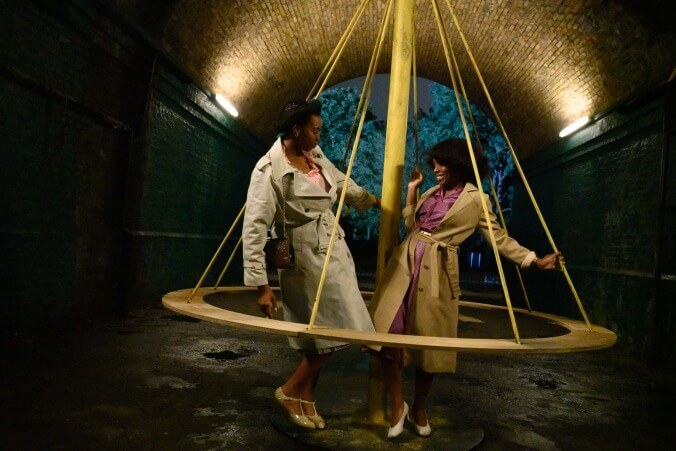Parties—remember those?—celebrate existing relationships while also offering the chance to meet someone new, that elusive person who’ll transform our lives. Director Steve McQueen throws one hell of a bash in Lovers Rock, the second installment in his Small Axe anthology, an ambitious exploration of London’s West Indian community spanning a period of decades. Lovers Rock begins with Martha (Amarah-Jae St Aubyn) sneaking out of her house late at night to meet up with her friend Patty (Shaniqua Okwok) at a South London house party in 1980. The guests, all first- and second-generation West Indians, fork over a 50-pence fee for admission. While one man desperately breaks into a phone booth to fund his evening’s entertainment, Martha and Patty are waved in free of charge. They are just that fine.
Inside, strangers dance intimately in a packed, steamy front room as the DJ holds court behind a turntable and keeps the party moving. The camera lingers on each sweat-soaked couple, whose bodies hint at unique, as yet unrevealed, stories. The music of choice is lovers rock, a genre of reggae that has little in common with rock ’n’ roll, especially of the period. Lovers rock is bass-heavy, soulful music, which never fails to set a romantic mood.
Lovers rock was considered less political than traditional roots reggae, but the genre boasted predominantly women performers and catered to an audience that was primarily female. That’s in itself a political statement, and this sexual tension provides the film’s conflict, as male aggression occasionally spoils the good vibes. Whenever ladies are enjoying themselves, a man swoops in with one thing on his mind. The flimsy romantic overtures barely disguise the threat of violence. The women can’t just kick back and relax. They have to keep up their guard and navigate an environment where physical danger lies around every corner. Franklyn (Micheal Ward), however, is a genuine charmer clad in leather, who hits it off immediately with Martha. Their banter is playful, but when they’re on the dance floor, it’s serious business. The sparks between them are the kind anyone hopes to ignite whenever fussing over their appearance just before going out.
Janet Kay’s 1979 single “Silly Games” threads the film’s auditory needle. Women sing the song, happily and enthusiastically off-key, while preparing the curries and stews the guests will enjoy later that night (at a reasonable price). During the film’s best scene, “Silly Games” becomes the party’s collective hymn, as guests sway with almost religious devotion. When the song ends, the DJ stands down and the crowd takes over with its own a cappella rendition. McQueen skillfully builds to this moment, which is fully earned and not overly choreographed.
Movies set over the course of a single social gathering can sometimes drag or feel aimless from a lack of purposeful narrative, but Martha is the catchy beat that holds Lovers Rock together. This is St. Aubyn’s screen debut, but she commands our attention throughout the film’s 70 minutes. Martha is smart, sultry, and grounded in the simple “church shoes” she’s teased for wearing. What’s endearing about Martha is that unlike the leads in some other party films, it’s clear she’s not out just to make the scene. The joy in her face is infectious as she dances to Sister Sledge, and when the DJ puts on “Everybody Was Kung-Fu Fighting,” she gleefully shows off her polished martial arts poses.
Nestled between the more confrontational Mangrove and Red, White And Blue, Lovers Rock is a soothing musical interlude within Small Axe. It provides an ideal entry point to McQueen’s epic anthology, much like the catchy hit single from a critically acclaimed album. This isn’t The Great Gatsby, where grand parties symbolize the shallowness and corruption of elite society. Lovers Rock reminds us of the magic that occurs when friends and strangers gather. It’s what we all crave right now. McQueen reinforces this theme with a somewhat bittersweet ending. On their way home, after a wonderful night together, Martha and Franklyn are subtly but firmly reminded of the period’s insidious racial hierarchy. This doesn’t feel tacked-on, but necessary to fully appreciate the cultural refuge these “blues parties” provided Black Londoners, who weren’t welcome in the city’s white nightclubs. The party where Martha and Franklyn met was a sacred event, a spiritual release and sanctuary from a white-dominated world. There, on the dance floor, Black joy was freely expressed.


 Keep scrolling for more great stories from The A.V. Club.
Keep scrolling for more great stories from The A.V. Club.